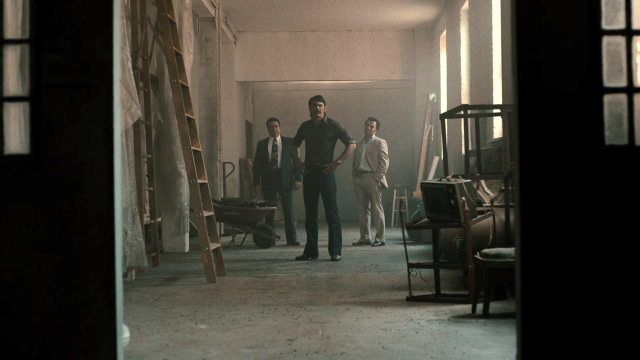The Deuce, episode 4: “I See Money”
Directed by Alex Hall / Written by George Pelecanos and Lisa Lutz
At one point in “I See Money,” Candy, having just performed oral sex on a john who collapses in a fatal heart attack, gets off the street to commiserate with fellow streetwalker Ruby, a.k.a. “Thunderthighs.” These women are old pros in a business with a short shelf-life, and that even in good times has its share of pains and aches. Earlier in her week, Candy got caught in the rain, went to work out of a decrepit porno theatre, where she blew a guy while a rat began to climb on his lap. A week earlier, she saw a guy stabbed to death on the street while she was trying to work.
Candy and Ruby sit down in Ruby’s apartment in a beautifully melancholic scene where actresses Maggie Gyllenhaal and Pernell Walker really shine. The two hookers share a drink and reminisce about a prostitute they knew once, always dressed in suede. From the way the two talk, you’d think she was a part of their life ages ago, but Candy sadly recalls “That was last summer,” and you realize that when every night is a working opportunity full of movie theatre blowjobs and panting, obese johns, time moves a lot slower. The weariness, the worn-out physicality of spending your days and nights on your feet, heels cracking, trash in the streets — it really hits you in this scene.
Candy Merrell has been through hell.
And in the last scene of the episode the rest of the world sees it simply as a joke.
The pimps crack lines about “the Mouth of Death” in Leon’s Diner over breakfast and Frankie leads a mock round of applause — all while Candy is sitting there right in front of them.
I think what this episode really demonstrates is the limits of understanding. Everyone along The Deuce seems to know everyone else. Bohemians rub elbows with pimps, wiseguys with drag queens, cops with hookers. It’s like Casablanca but with more fucking (everyone cums at Rick’s?). But despite the collision of interests, the close contact, the liminal space that places like The Hi-Hat offer, hovering between the legitimate and illegitimate worlds, people still have a hard time seeing each other as people, walking around in their own heels. What might have been the worst night of Candy’s life (though who knows?) is nothing more than fodder for crude ribbing in Frankie’s world.
You see this too with Abby and Darlene. Abby wants to understand Darlene’s life, or at least, Abby thinks she does. She talks to her, asks her about her family, where she comes from. Later in the episode, she gifts Darlene a copy of Graham Greene’s Travels with My Aunt and slips a bus ticket out of New York City inside it. Darlene’s reaction probably isn’t what Abby was hoping for — she all but rolls her eyes, more interested in the book than in the ticket, and goes off to have what was no doubt a tense exchange with Larry, rather than the expected “Oh thank you, thank you!” Abby was almost imagining. After a few nights at The Hi-Hat and a couple conversations, Abby thinks she understands enough of Darlene’s life to be able to know just what it is she both needs and wants. And it seems she’s wrong.
And Vincent, who is essentially a well-meaning guy, is still working his way around the LGBTQ world, stumbling his way around misgendering and pronouns when talking to bartender Paul, who later tells his boyfriend that Vincent — who probably thinks of himself as a tolerant and open-minded person — “isn’t completely an asshole,” demonstrating the limits of Vincent’s brand of wiseguy egalitarianism.
Sandra the reporter is getting a little bit closer in every episode to where she wants to be, but she’s still far from understanding. While she knows enough to keep her head down when the cops pick up the streetwalkers, and that if he she says nothing she might be mistaken for one of them, her shoes give her away — at least according to Officer Alston, who gets her out of jail when realizing she’s not part of “the life.” Incidentally, Alston’s The Wire-lite struggle with the bosses as he’s reprimanded for bringing in a heroin pusher working in a “no go” zone hints at the bigger sociopolitical context of what’s going on, but for the most part, this is maybe the most intimate and personal episode of The Deuce yet, largely because of Candy’s plotline.
We’re now officially halfway done with the first season of The Deuce, and like any David Simon series, things are beginning to come together, slowly but surely, but regardless of what happens in the end, I think what we as viewers have learnt — or at least, thought we’ve learnt — about this time, this place, this moment in the world, has made the journey more than worthwhile so far.

